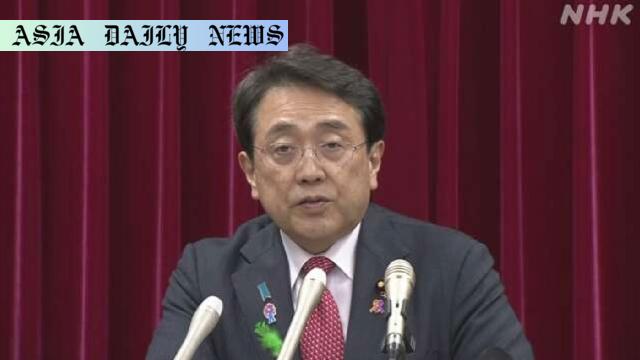Tariff Talks: Japanese Economic Minister Akazawa Ryosei heads to Washington to finalize tariff negotiations with U.S.
- Japan’s Economic Revitalization Minister is heading to Washington for tariff negotiations.
- Meeting with U.S. Treasury officials aims to strengthen economic relations and address trade imbalances.
- Japan plans new proposals including investment in the U.S. and greater cooperation in shipbuilding.

Japan’s Efforts to Strengthen U.S.-Japan Economic Ties
Japanese Economic Revitalization Minister Akazawa Ryosei is making significant strides toward enhancing Japan’s trade relationship with the United States. This week marks another pivotal moment as he heads to Washington, D.C., to engage in a new round of tariff negotiations. These discussions, scheduled to take place with U.S. Treasury Secretary Scott Bessent, are part of Japan’s proactive efforts to support mutual economic growth and navigate the challenges of international trade diplomacy.
At the core of these discussions is the emphasis on mutual benefits. Japan is bringing forward proposals designed to address U.S. concerns about trade imbalances. Among these, expanding Japanese investment in U.S. industries and fostering bilateral cooperation in shipbuilding are key components. These initiatives align with U.S. priorities under President Donald Trump’s administration, which has been particularly vocal in addressing trade deficit issues with global partners.
A Strategic Partnership in Trade
The strategy behind these negotiations is intricately linked to strengthening the rapport between the two nations. This partnership is especially critical as decisions made during these deliberations have the potential to impact global commerce. Minister Akazawa, following a recent meeting with Japan’s Chief Cabinet Secretary Hayashi Yoshimasa, expressed confidence and determination to achieve meaningful progress. Their plans have been meticulously coordinated to ensure that Japan’s position resonates with U.S. concerns, paving the way for a win-win outcome.
A particular highlight of the upcoming talks is the presence of Scott Bessent, a trusted figure within President Trump’s administration. His role in the negotiations underscores the gravity of this dialogue, and Japan’s negotiators are keen to leverage this opportunity to propose measures enhancing automotive trade and investment, areas that are critical to addressing the trade deficit. This will likely be a significant step forward in fostering trust and collaboration between the two nations.
Focus on Mutual Growth and Future Cooperation
As Japan and the United States continue this dialogue, their focus extends beyond immediate trade concerns to more sustainable, long-term cooperation. The inclusion of measures that streamline the import of U.S. vehicles into Japan indicates Japan’s willingness to engage constructively with one of the pivotal trade concerns raised by the U.S. administration. Furthermore, Japan’s plan to enhance investment and shipbuilding collaboration speaks volumes about its commitment to addressing these challenges holistically.
This ongoing story is one of international diplomacy, economic strategy, and mutual respect, showcasing how thoughtful negotiation paired with shared priorities can yield positive outcomes for both nations. Within the ever-evolving landscape of global trade, Japan’s leadership in establishing these pathways demonstrates their ability to advocate for their country while fostering international goodwill. These efforts not only strengthen bilateral economic ties but also provide a framework for resolving similar issues in broader global trade networks.



Commentary
Reflecting on Japan’s Strategic Tariff Negotiations
Japan’s ongoing tariff negotiations with the United States represent a critical chapter in modern international trade relationships. This diplomatic initiative highlights how economic strategy can serve as a tool to foster bilateral trust and ensure sustainable partnerships in an ever-changing global economy.
What stands out here is Japan’s proactive approach. By preparing detailed proposals that align with U.S. priorities, Japan not only neutralizes potential areas of conflict but also ensures that its long-term goals remain achievable. The plans to expand investment in American industries and address trade imbalances through enhanced vehicle imports demonstrate Japan’s readiness to adapt to changing dynamics while preserving its own economic interests.
The Role of Effective Negotiations in Economic Diplomacy
The presence of Scott Bessent in this dialogue adds a layer of complexity and opportunity. Bessent’s perceived influence with President Trump ensures that Japan’s proposals, if executed effectively, have a better chance of being considered with the seriousness they deserve. Such high-level engagements serve as reminders of how personal trust and strategic relationships among key players shape larger trade outcomes.
The broader implications of this effort go beyond just U.S.-Japan relations. At a time when protectionism and trade deficits dominate global headlines, Japan’s case underscores the importance of mutual compromise and long-term vision. Whether it’s through shipbuilding cooperation or more streamlined vehicle imports, Japan’s actions set a precedent for other nations seeking to navigate challenging trade discussions.
A Hopeful Outlook for Bilateral Relations
In conclusion, Japan’s diplomatic initiative reflects its ability to combine foresight, strategy, and adaptability. If these negotiations succeed, they could strengthen not only economic ties but also serve as a model for other nations striving for balanced and mutually beneficial trade agreements. By focusing on shared growth and cooperation, both nations can set a powerful example of how strategic partnerships can thrive in an interconnected world. This is a powerful statement of Japan’s ability as a world economic leader, not just for today, but for the future of global trade relations.